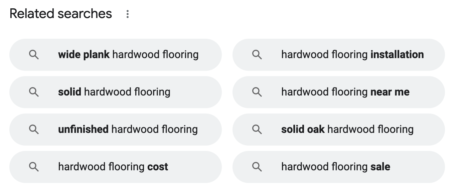In the past, you could boost SEO via keyword density. This meant repeating the exact target keyword phrase often throughout your content. This sent a relevancy signal to search engines for better rankings.
Today, this spammy approach would be disastrous. Not only would search engines penalize this content before it could rank, but countless users would bounce due to poor writing. This leads to clickbacks that also harm rankings.
However, has this once-powerful on-page SEO factor been superseded by something more intricate?
Yes, and it’s called keyword relatedness.
Addressing subtopics related to your page’s keyword theme not only helps search engines understand it, but it’s more comprehensive. Therefore, it’s perceived as more helpful within the algorithm. This also ties your content to a broader pool of related searches, so more organic traffic.
Here are 5 ideas to improve keyword relatedness:
- Use Google’s autocomplete, by entering your keyword phrase into the search field, then check out suggested queries. TIP: Experiment when partial keyword entries and modify the keyword order.

- After performing a search, scroll to the bottom to view Related searches.

- View the People also ask section, usually further down and not above-the-fold, that shares related content.

- Examine subtopics covered by the top 3 pages in the SERPs for the keyword.
- Add something unique to all these sources, yet requiring expert knowledge.
Addressing these subtopics, by going through this process, will improve keyword rankings in a way that keyword density achieved in the now-distant past.
